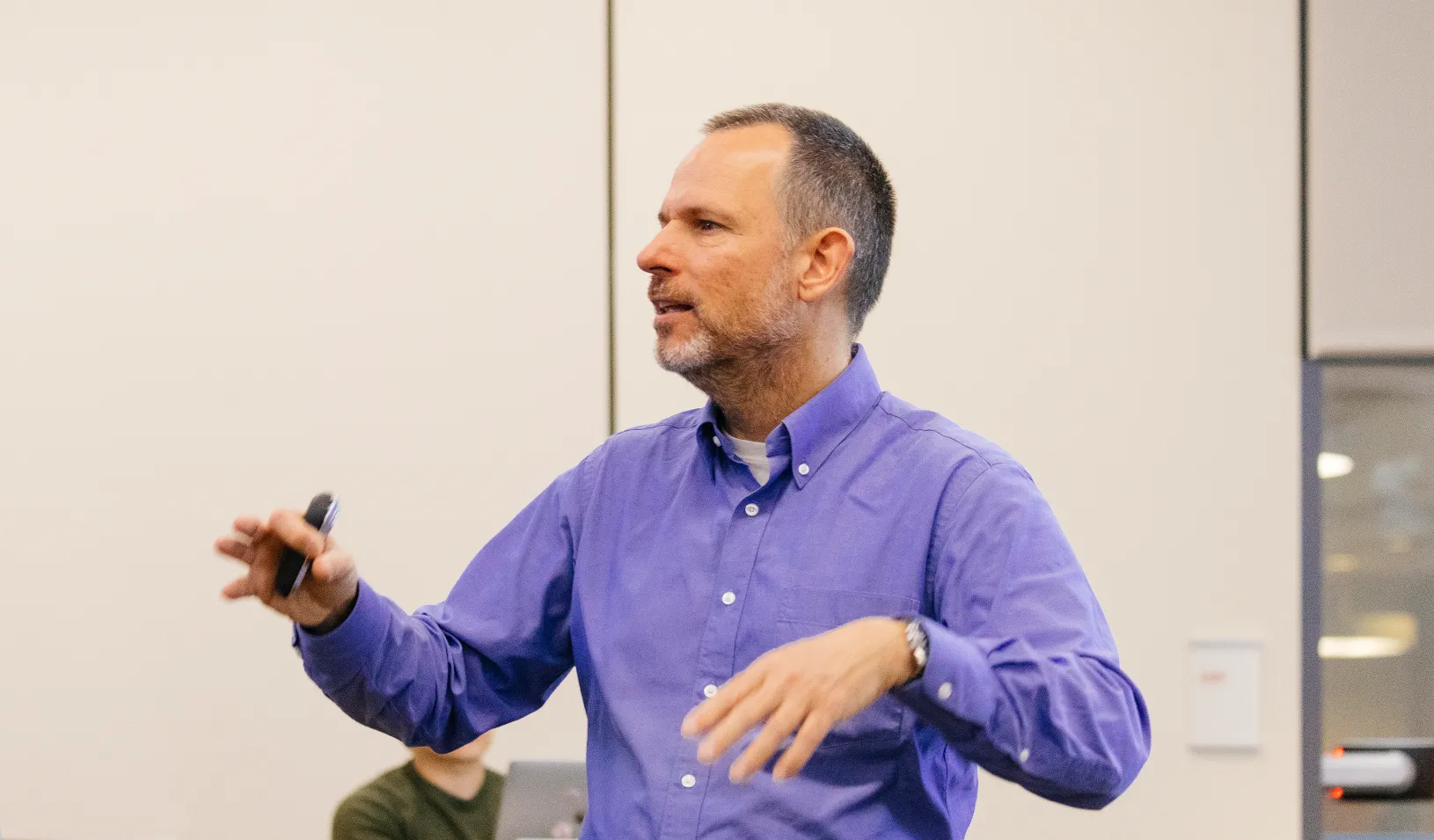
Professor of accounting Joseph Piotroski, co-director of the Strategic Chief Sustainability Officer Program | Elena Zhukova
In the past decade, chief sustainability officers (CSOs) have emerged as key players in the business community, integral to organizational goals to operate in a more sustainable way.
As demand for the position grows, a gap has emerged: Many new CSOs come with a background in either business or sustainability work, but seldom both. That leaves them without the skill set needed to advance their company’s mission.
Stanford’s Strategic Chief Sustainability Officer Program aims to fill that gap. A collaboration between the Stanford Doerr School of Sustainability and Stanford Graduate School of Business Executive Education, the program brings a unique combination of business skills and sustainability science to current and aspiring CSOs.
Interviews with the target audience served as a guide in developing content for the hybrid online and in-person model.
“Chief sustainability officers are tasked with a very important role inside their companies, but we found they frequently lacked the background and expertise needed to make the business case for sustainability,” said Joseph Piotroski, co-director of the program and Robert K. Jaedicke Professor of Accounting.
Piotroski worked with co-director Chris Field, director of the Woods Institute for the Environment, to develop the program.
Variety of Backgrounds
Where the CSO role sits in the leadership hierarchy varies from organization to organization almost as widely as the backgrounds of the individuals filling the roles.
“There are many paths to the CSO office. Some individuals have human resources backgrounds, while others specialized in engineering or operational dimensions of the business. Many CSOs are individuals who, at one point in their career, worked outside the business in capacities as varied as environmental attorneys, as scientists, or as staff at environmental NGOs,” Piotroski said. “Yet despite these differing backgrounds, they tend to have one thing in common — they are very passionate about making a difference in the world.”
They also share another commonality, Piotroski noted: CSOs tend to have responsibility for sustainability without the authority to enforce sustainable actions.
“Frequently lacking formal authority over many of the organization’s activities, CSOs need to galvanize the support of others to succeed. They need to be able to tell the story of why a sustainable business strategy makes sense for the organization and how it will lead to value creation,” Piotroski said. “By empowering these leaders to think strategically and view their decision through a business lens, they will be able to galvanize support, get the necessary buy-in across the organization, and become effective and impact business leaders.”
Those are exactly the skills that the Strategic CSO Program wants to develop.
Field noted that those coming to the role from outside the business world often feel they lack the polish and the special skills needed for them to be effective in the executive suite. Additionally, they may bring a background in one particular area of sustainability — such as supply chain issues or carbon emissions — and need to expand their knowledge about other challenges their company may be facing.
“We want to help people in these roles broaden their exposure to sustainability issues and make sure they have the tools to do the best possible work,” Field said. “By doing some deep dives into these issues, we see a big opportunity to bring participants’ sustainability world view to the next level of sophistication.”
Interdisciplinary Collaboration
More than two dozen faculty from the two schools are supporting the new program, with the first cohort launching in July 2024. The four-month program is divided into three modules meant to fit into the lives of working professionals. Modules one and three offer self-paced and synchronous online coursework. In module two, participants will spend a week at Stanford University, digging into material with faculty experts and learning from their fellow cohort members. The co-directors plan to make the program an annual offering, with adjustments based on student need and feedback.
Program content focuses on five key interdisciplinary themes:
- Creating and sustaining a competitive advantage
- Sustainable business models and related business ecosystems
- Personal leadership skills
- Financial literacy
- Key perspectives on sustainability
“The chief sustainability officer role is new in most companies, and they haven’t really figured out how to take full advantage of these positions and what kind of skill sets people need to have,” Field said. “We’re trying to work with people who are currently in the roles or aspire to be CSOs and help them figure out what skills will be most useful, what they can do to sharpen them, and how they’ll help companies take full advantage of their sustainability expertise.”
An aspect that sets the program apart from fully academic programs is the participants’ ability to give real-time feedback about how lessons from the program translate to the business world.
“It has the potential to be connected with very near-term outcomes,” Field said. “I’m confident that they’ll be able to take what they are learning back to their jobs the very next day, and I’m optimistic it will help them make a difference.”
Originally published on January 25, 2024 by the Stanford Doerr School of Sustainability
For media inquiries, visit the Newsroom.



